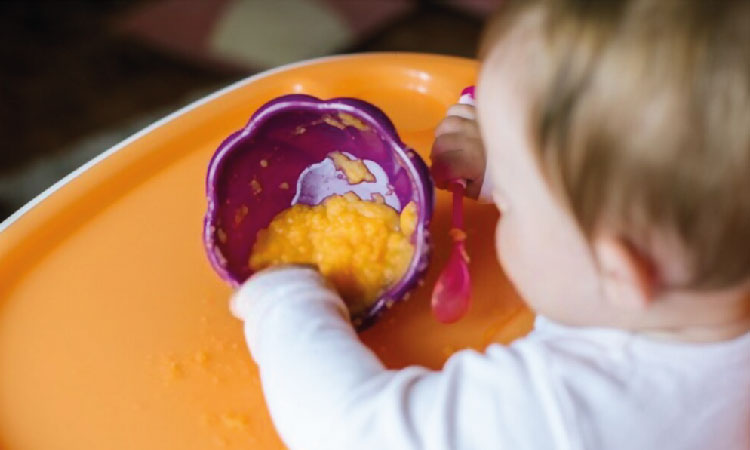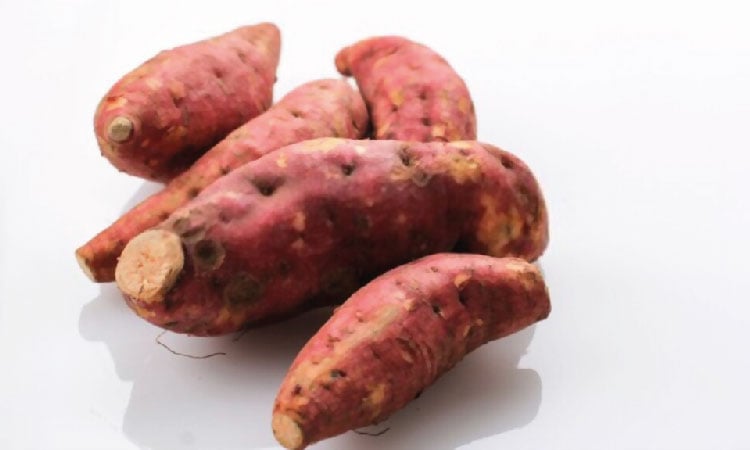When the baby reaches the benchmark age of six months, it is time to start feeding them solid foods. Many new parents worry about how healthy different foods are for their babies. Despite this, a vast majority of parents opt to feed their young children sweet potatoes. When it comes to giving their infants their first taste of solid food, many first-time mothers choose to introduce their young children to sweet potatoes rather than vegetables. Well, the reasons are exactly what you are thinking.
Since sweet potatoes taste sweeter than other vegetables, they are more appealing to babies. However, the nutritional benefits of sweet potatoes for babies go beyond their deliciousness. If you start feeding your baby sweet potatoes at a young age, you’ll be giving them a healthy dose of food that will help them grow and thrive.
Is Sweet Potato Good For Babies?
Not only vitamin A, but also vitamin C, vitamin E, vitamin K, and vitamins B1 to B6 and B9 are present in sweet potatoes, making them a nutritious choice for infants. These vitamins play a crucial role in ensuring that infants’ many organs develop normally and that they reach important milestones on time. Moreover, sweet potatoes are easy to digest, and their naturally sweet flavor makes them a great choice as a baby’s first solid food.
However, you should talk to your pediatrician before giving your baby sweet potatoes if he or she has a history of allergies, particularly to orange vegetables. Babies always require extra care and attention when trying out new foods. Even if there is no history of allergies in your family, you should be on the lookout for signs of an allergic reaction, such as hives, swelling, difficulty breathing, or vomiting, after giving your baby sweet potatoes.
Related Reading: New-Born Care After Delivery At Home: 9 Practical Tips
When Can You Start Feeding Sweet Potato To Your Baby?
Babies can get a lot of the nutrients they need from sweet potatoes if you start giving them to them early on. Steamed sweet potatoes are a great first solid food for babies as young as 6 months old.
Give a small spoonful of mashed sweet potato at first, and gradually increase the amount each day until the baby is ready to eat one whole sweet potato at a sitting. It could take some time for the baby to adjust to the sweetness of sweet potatoes. In any situation, forcing a baby to eat is never a good idea.
If your child is younger than six months, you should discuss the introduction of sweet potatoes or any other new food with your child’s pediatrician. Till that age, all a baby needs is breast or formula milk.
Nutritional Value Of Sweet Potato
Why are sweet potatoes good for babies?Sweet potato is a source of nearly all the essential minerals the body needs, namely calcium, iron, magnesium, phosphorus, potassium, sodium, and zinc. It has zero cholesterol. Here is the nutritional chart that breaks down the quantity of these nutrients in 100 g of sweet potato1.
- Water: 77.3g
- Energy: 86 kcal
- Protein: 1.57g
- Total lipid (fat): 0.05g
- Carbohydrate: 20.1 g
- Fiber: 3g
- Sugars: 4.18g
- Starch: 12.6g
For every 100 grams of sweet potatoes, you’ll find the following minerals:
- Calcium: 30 mg
- Iron, Fe: 0.61 mg
- Magnesium: 25 mg
- Phosphorus: 47 mg
- Potassium: 337 mg
- Sodium: 55 mg
- Zinc: 0.3 mg
- Copper: 0.151 mg
- Manganese: 0.258 mg
- Selenium: 0.6 µg
As is evident, sweet potatoes are quite impressive when it comes to nutrition.
Sweet Potato – Benefits For Babies

Your infant must consume foods that are rich in essential vitamins and nutrients. Sweet potatoes are a good source of beta-carotene, potassium, vitamin C, and fiber. Due to beta-carotene’s antioxidant properties, eating sweet potatoes can help prevent some types of cancer. This is because beta-carotene also gets rid of harmful free radicals. Manganese, B6, Pantothenic acid, and vitamin A are especially abundant in sweet potatoes.
Following are some of the health benefits of sweet potatoes for babies
1. Improves baby’s vitamin A status
Sweet potatoes with orange flesh are a great way to get the beta-carotene needed to produce vitamin A. Babies to need plenty of vitamin A for healthy eye and immune system development. Consuming sweet potatoes regularly has been shown to increase vitamin A status in infants and young children in a number of studies. High-provitamin A sweet potatoes can supply 100% of daily Vitamin A.
Related Reading: 8 Must Have Fruits For Kids In Winters
It has been shown that the provitamin A in orange sweet potatoes (OSP) raises children’s vitamin A levels and makes diarrhea less likely and lasts less long. Vitamin A deficiency increases the risk of illness and death from diarrhea and measles in young children. Extreme deficiencies can cause blindness2.
2. Sweet potatoes are excellent for promoting cognitive growth
The memory-improving effects of the bioactive compounds in purple sweet potato are well-documented. Brain- and memory-enhancing nutrients are especially important for a growing infant. This is yet another way in which sweet potatoes benefit babies. Yes, so ghee is not the only food that helps brain development.
Flavonoids called anthocyanins can be found in sweet potatoes, and they have been shown to have neuroprotective effects by lowering inflammation in the brain. They could also help a baby learn and remember things better3.
3. They help to fight allergy
A compound called quercetin is found in sweet potatoes and has been shown to be effective in combating allergies. Quercetin is a natural antihistamine and anti-inflammatory, making it useful for treating allergies. Scientists speculate that quercetin can alleviate allergy symptoms like a stuffy nose, itchy eyes, hives, and swelling.
4. Sweet potatoes can improve infant gut health
A baby’s ability to digest food and absorb its nutrients depends on the state of his or her digestive system. It is well known that infants’ digestive systems benefit greatly from a diet high in fiber. Both soluble and insoluble fiber are present in sweet potatoes. The prebiotic properties of the dietary fibers in sweet potatoes suggest that they may improve gut health by changing the makeup of gut microbiota. Also, the antioxidants in them encourage the growth of good bacteria in the digestive tract, which makes digestion easier4.
Related Reading: 7 Common Choking Hazards For Babies At Home And What Can You Do?
5. They strengthen your infant’s immune system
Babies’ immune systems are still developing, so the food they eat needs to contain elements that will help strengthen them. For this purpose, nothing beats a sweet potato. Vitamin B complex and vitamin C are abundant in sweet potatoes, and they also have a respectable amount of phosphorous and iron5.
These nutrients are associated with better immune function. Beta-carotene, a powerful antioxidant found in sweet potatoes, has been shown to improve overall immune function. Antioxidant, anti-inflammatory, and antimicrobial properties have been found in sweet potatoes. The way these nutritional and phytochemical compounds work together may help a baby’s immune system.
6. Offer protection against inflammation
Inflammation and gastric attacks are common in infants, especially in the first few days of solid food introduction. The consumption of sweet potatoes has been shown to have anti-inflammatory effects6. Giving a baby a sweet potato as one of their first solid foods may help to reduce inflammation in the intestinal lining, which helps prevent many different gastrointestinal problems.
7. Help to relieve asthma and bronchitis symptoms

Respiratory illnesses, such as the common cold and cough, are common in children younger than one-year-old. Babies frequently struggle with respiratory conditions like bronchitis and asthma at a young age.
Sweet potatoes contain carotenoids, a form of vitamin A that aids in histamine breakdown and provides protection against asthma attacks7. The resulting relief from congestion in the bronchi and pulmonary airways is significant. In the same way, the high concentration of vitamin C helps relieve cold and cough symptoms by warming the body and keeping the core temperature normal. This makes fever or a high temperature less severe if they do happen8.
8. Help ward against cancer
Compared to other fruits and vegetables, sweet potatoes have a significantly higher quercetin content9. Quercetin is an antioxidant that has been shown to inhibit the growth of tumors.
Several types of antioxidants found in sweet potatoes have been linked to a decreased risk of developing cancer as per this source. As a result, including them in your infant’s diet before the age of a year can significantly lessen the likelihood that he or she will develop cancer in the future.
Related Reading: 10 Common Reasons Your Baby Is Not Gaining Weight
9. Other benefits of sweet potatoes for babies
In order to meet your baby’s nutritional and energy needs, you can moderately add sweet potatoes to their diet.
- Calcium, phosphorus, and magnesium are just a few examples of the nutrients that can aid in bone development and strength in the developing baby. These nutrients are naturally present in sweet potatoes
- A baby’s weight gain may benefit from the starch (carbohydrate) and other nutrients found in sweet potatoes
- Iron and vitamin B6 are two nutrients in sweet potatoes that have been linked to reducing the risk of anemia
Can Baby Eat Sweet Potato Everyday
There is no harm in feeding the baby a moderate amount of sweet potato every day. However, rotating sweet potatoes with other fruits and vegetables on a daily basis is a great way to make sure your baby gets a wide variety of essential nutrients. Even if a particular vegetable or fruit is particularly nutritious, it is not a good idea to rely on it as the sole source of those nutrients for a baby.
How To Prepare And Offer Sweet Potatoes To Infants
If you want to keep as many of the healthy nutrients in baby’s sweet potatoes as possible, here are the best ways to cook them:
- One of the best ways to prepare sweet potatoes for a baby is to steam them. Sweet potatoes should be soft when pierced with a fork after being steamed. This cooking method preserves vitamins
- As a second-best option, you can bake or roast sweet potatoes for infants. Both whole and skinned potatoes can be baked successfully. In the second scenario, you pierce it several times with a fork and bake it at 400F for 45-55 minutes (depending on its size). Then you can use a spoon or fork to remove the contents
- The least favored approach is generally boiling sweet potatoes since the majority of the nutrients will leak into the boiling water you will probably reject. For making soups and purees, this approach works best since you can preserve the water along with the drained nutrients
- Pureed sweet potato (cooked and mashed sweet potato blended with a little liquid to thin it out) is another method to serve sweet potatoes for babies. Water, breastmilk, stock, or animal or plant milk can be used as the liquid. This is a great option for a baby’s first solid food
- You can cut sweet potatoes into strips and cooked for baby-led weaning (or finger food)
Side Effects Of Sweet Potato For Babies
- Baby food allergies are common, and sweet potatoes are no exception. In light of this, keep an eye out for the allergic signs after giving your baby his or her first sweet potato
- Most carbohydrates, including sweet potatoes, are starches that produce gas in the intestines. You could try giving your baby some sweet potatoes, but you should only give them in small amounts
Conclusion

There are a variety of preparation methods for sweet potatoes that can be used to make baby food as well as finger foods. In addition to this, you incorporate various other vegetables into their diet by offering them as finger foods. Therefore, it is best to introduce the baby to a single vegetable at a time to ensure that the baby will enjoy each individual vegetable. If the child does not want to eat sweet potato, take a break from offering it to them for a week or two, and then try offering it again in a different form after that time period.
FAQ’s
The purple sweet potato has the greatest nutrient density of any kind. Compared to regular sweet potatoes, it’s higher in antioxidants. Nevertheless, beta-carotene may be found in abundance in orange sweet potatoes.
Age and appetite determine how much you can feed your infant. If you’re introducing sweet potato puree at six months, a decent rule of thumb is to start with one tablespoon and increase the quantity over time.

